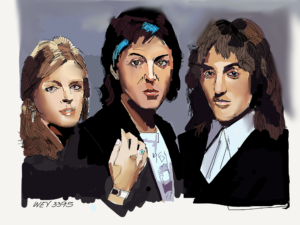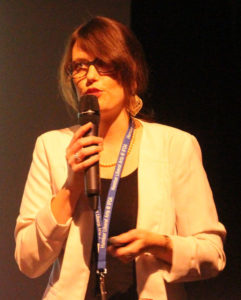Podcast: Play in new window | Download

Part One: Background Theory and The Beatles
This show represents a deep (3 hour) dive into examining the evolving language of rock criticism: the ideology employed – the fluid definitions of “rock” and “pop” – the application of “authenticity” as a value to an artist’s work, in this specific case, Paul McCartney and Wings. The 1970s was a time when rock critics achieved nearly the status of rock icons themselves: everyone from John Mendelssohn and Jon Landau to Simon Frith and Lester Bangs. Paul’s post-Beatle career stands as an example of an artist that reviewers struggled to get a handle on, resulting in sometimes unfair assessments.
Leading this exploration is PhD candidate (with an M.A. in Beatles, Popular Music, and Society) Allison Bumsted, currently studying in England at Liverpool Hope University. For ease of listening, the conversation has been split into two 90 minute parts. 


Funny that you should play the Keane track as I can confirm they are indeed big fans of Macca. I know because when I saw Paul play Hampden park in Glasgow in 2010 the Guys from Keane were in the crowd to see him.
Funny that you should play the Keane track as I can confirm they are indeed big fans of Macca. I know because when I saw Paul play Hampden park in Glasgow in 2010 the Guys from Keane were in the crowd to see him.
Having met Allison in August at the Rococo Coffee House in Liverpool, when she mentioned her upcoming podcast on SATB, I enjoyed part one immensely. Having come of age during the 1970s – I was 18 at the start of the decade – the whole pop/rock/authenticity discussion took me back to countless animated conversations with music enthusiasts throughout that decade and beyond. Thanks for this.
Alan! So great that you listened! Thank you for the CD, very cool!
Having met Allison in August at the Rococo Coffee House in Liverpool, when she mentioned her upcoming podcast on SATB, I enjoyed part one immensely. Having come of age during the 1970s – I was 18 at the start of the decade – the whole pop/rock/authenticity discussion took me back to countless animated conversations with music enthusiasts throughout that decade and beyond. Thanks for this.
Alan! So great that you listened! Thank you for the CD, very cool!
Ah, the mysterious John Mendelsohn. I think his biggest claim to fame was his part in building up the legend of Ray Davies for American audiences through his liner notes for The Kink Kronikles and The Great Lost Kinks Album. (Maybe you get into that in part 2, we’ll see. Cheers!)
Ah, the mysterious John Mendelsohn. I think his biggest claim to fame was his part in building up the legend of Ray Davies for American audiences through his liner notes for The Kink Kronikles and The Great Lost Kinks Album. (Maybe you get into that in part 2, we’ll see. Cheers!)
This podcast and part two too, provides a splendid time guaranteed for all Beatles’ fans who think quite a lot about the music and the band, and in what cultural context they operated and were judged by too many people preaching practices and prejudices. Robert and Allison, THANKS!
This podcast and part two too, provides a splendid time guaranteed for all Beatles’ fans who think quite a lot about the music and the band, and in what cultural context they operated and were judged by too many people preaching practices and prejudices. Robert and Allison, THANKS!
Back when I read “Rock critics” in Rolling Stone, Creem etc…what really sticks in my mind is that 90% of what they talked about was lyrics, they seldom mention melodies or instrumental work at all.
Back when I read “Rock critics” in Rolling Stone, Creem etc…what really sticks in my mind is that 90% of what they talked about was lyrics, they seldom mention melodies or instrumental work at all.
Your guest is a delight, so witty and thoughtful. You make a great team… thank you, this was a lot of fun and a great glimpse into the gears of beatles academia … the meaning of authenticity and definitions of pop and rock are fascinating. Writing your own songs, though, doesn’t seem to have much to do with the meaning of authenticity in music, as there are covers more authentic than the song played by the song writer… and besides many songwriters are just painting by number following a formula – and the Beatles show us that writing songs you believe isn’t a necessary factor in authenticity (as John and Paul claimed they would be writing themselves swimming pool, yet it somehow came out authentic sounding). What a mystery. Could it be that this quality has something to do with having a burning passion for what you’re performing, regardless of how pure your motives are, or if you wrote it or not, or if there’s any talent or chops. Maybe also inspiration is part of it, a whole other can of worms.
Your guest is a delight, so witty and thoughtful. You make a great team… thank you, this was a lot of fun and a great glimpse into the gears of beatles academia … the meaning of authenticity and definitions of pop and rock are fascinating. Writing your own songs, though, doesn’t seem to have much to do with the meaning of authenticity in music, as there are covers more authentic than the song played by the song writer… and besides many songwriters are just painting by number following a formula – and the Beatles show us that writing songs you believe isn’t a necessary factor in authenticity (as John and Paul claimed they would be writing themselves swimming pool, yet it somehow came out authentic sounding). What a mystery. Could it be that this quality has something to do with having a burning passion for what you’re performing, regardless of how pure your motives are, or if you wrote it or not, or if there’s any talent or chops. Maybe also inspiration is part of it, a whole other can of worms.
It would be nice to give the guest more space to express herself next time. Very male dominated.
It would be nice to give the guest more space to express herself next time. Very male dominated.
Pingback: 227A: The Girls’ Get Back part one | Something About The Beatles
[…] My special guest co-host: Dr. Allison Bumsted, who herself previously guested in 2019 in 176A and 176B: Critiquing The Critics: A Case Study with […]
Pingback: 247: Critiquing The Critics II – This Time It’s Personal with Bill Wyman | Something About The Beatles